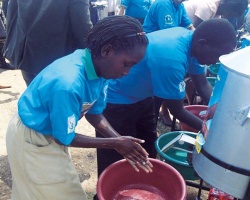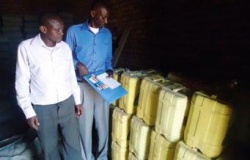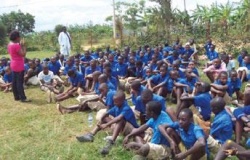Water for People - School sanitation story from Rwanda
Country: Rwanda
Giving children responsibility increases their commitment to upkeep of their sanitation facilities
Basic data:
The school sanitation project was carried out and initially financed by Water for People. 1,147 students and 22 staff members a benefit from the project t the Burgea School Complex, which is by now self-sustainable.
The project and the experiences:
At the Burega School Complex, more than 80 students used to have to share one toilet, the toilets were often nearly full, and there was nowhere for hand washing. “When the bell rang we started running to the latrine. Even when you were fast, there was a long queue and sometimes the break was over before it was your turn. We then had to return to class and couldn’t concentrate for the whole lesson,” says a student. For the female students the situation was even worse during their period, since there was no privacy for changing pads or washing. A girl explains: “Sometimes we had to leave school earlier or could not attend at all, because there was no possibility to manage the menstruation. We were very afraid of staining our uniforms so we rather stayed at home than embarrassed ourselves.”
With the installation of urine-diverting ecological toilets, the girl now says,“We have a lot more and also much cleaner and hygienic ecological toilets. There is even a shower for the girls and female teachers to wash their selves. An incinerator for the disposal of sanitary napkins, which helps us to keep the toilets clean was also installed.”
The school management in collaboration with the newly-established hygiene club has set up teams of students who take turns cleaning the toilets and ensure that water is always available in the plastic water tanks for hand washing. The hygiene clubs also report to the school management if there are any issues or maintenance needs for the sanitation system.
The parents’ committee also supports the school by monitoring the use of the money earned from the sale of the urine and human manure. Together, the parents and school management decided to employ additional staff to take care of daily maintenance and operation of the ecological toilets.
The school management adds: “We were able to find a permanent customer who regularly collects the urine from our school by carrying the jerry cans of urine in his van.” As a result, project manager Prudent Gatera proudly reports that the project is self-sustaining due to the income generated from the collected waste products. She adds, “The income does not only cover the expenses. Since the start of the project in mid-2012, we were able to save 100,000 RwF (1,500 $) in the school’s bank account.”
The key lessons of the story:
Prudent highlights the following institutional aspects as helpful:
- Long term contracts increase bilateral security of consumers and suppliers.
- Shared responsibilities among stakeholders increase commitment towards the project.
- Including menstrual hygiene management for girls raises school attendance.
- Organising hygiene clubs results in a multiplier effect.
Contribution to the SuSanA sustainability criteria
Technically appropriate, including O&M:
All stakeholders contribute to system operations and maintenance.
Be financially and economically viable:
Sanitation infrastructure can become self-sustaining.
Project location: Burgea School Complex, Rwanda
Executing institution and finance: Water for People
Project partners: WECF
Water For People exists to promote the development of high quality drinking water and sanitation services, accessible to all, and sustained by strong communities, businesses, and governments.
WECF (Women in Europe for a Common Future) is a non-governmental organization established in 1994 following the 1992 Earth Summit in Rio de Janeiro, to give women a stronger voice in the field of sustainable development and environment. WECF strives for balancing the environment, health and economy, taking the different needs and perspectives of women and men into account and implements solutions locally and influences policy internationally.
Contact
Perpetue Kamuyumbu
Water for People
pkamuyumbu![]() waterforpeople.org
waterforpeople.org



